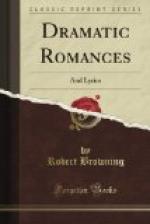Blessed was he whose back ached with the jerkin 240
His sire was wont to do forest-work in;
Blesseder he who nobly sunk “ohs”
And “ahs” while he tugged on his grandsire’s trunk-hose;
What signified hats if they had no rims on,
Each slouching before and behind like the scallop,
And able to serve at sea for a shallop,
Loaded with lacquer and looped with crimson?
So that the deer now, to make a short rhyme on’t,
What with our Venerers, Prickers and Verderers, 250
Might hope for real hunters at length and not murderers,
And oh the Duke’s tailor, he had a hot time on’t!
XI
Now you must know that when the first dizziness
Of
flap-hats and buff-coats and jack-boots subsided,
The
Duke put this question, “The Duke’s part
provided,
Had not the Duchess some share in the business?”
For out of the mouth of two or three witnesses
Did he establish all fit-or-unfitnesses:
And, after much laying of heads together,
Somebody’s cap got a notable feather
By the announcement with proper unction
260
That he had discovered the lady’s function;
Since ancient authors gave this tenet,
“When
horns wind a mort and the deer is at siege,
Let the dame of the castle prick forth on her jennet,
And
with water to wash the hands of her liege
In a clean ewer with a fair toweling,
Let her preside at the disemboweling.”
Now, my friend, if you had so little religion
As
to catch a hawk, some falcon-lanner,
And
thrust her broad wings like a banner 270
Into a coop for a vulgar pigeon;
And if day by day and week by week
You
cut her claws, and sealed her eyes,
And clipped her wings, and tied her beak,
Would
it cause you any great surprise
If, when you decided to give her an airing,
You found she needed a little preparing?
—I say, should you be such a curmudgeon,
If she clung to the perch, as to take it in dudgeon?
Yet when the Duke to his lady signified,
280
Just a day before, as he judged most dignified,
In what a pleasure she was to participate,—
And,
instead of leaping wide in flashes,
Her
eyes just lifted their long lashes,
As if pressed by fatigue even he could not dissipate,
And duly acknowledged the Duke’s fore-thought,
But spoke of her health, if her health were worth
aught,
Of the weight by day and the watch by night,
And much wrong now that used to be right,
So, thanking him, declined the hunting—
290
Was conduct ever more affronting?
With all the ceremony settled—
With
the towel ready, and the sewer
Polishing
up his oldest ewer,




